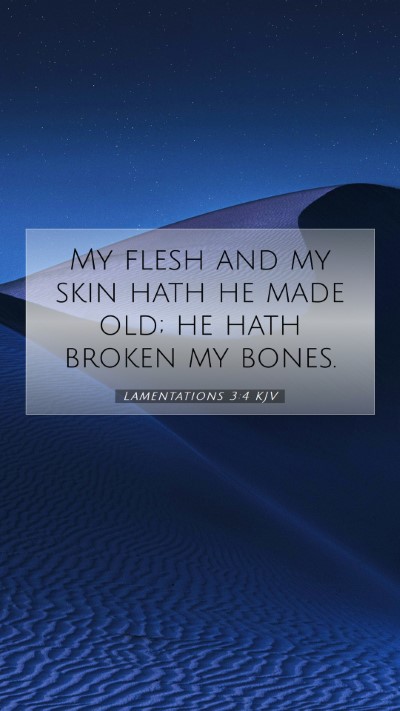Lamentations 3:4 - A Deep Dive into Meaning and Interpretation
The verse Lamentations 3:4 encapsulates profound themes of suffering, despair, and the sovereignty of God, making it a significant scripture within the context of biblical understanding. This analysis aims to elucidate the bible verse meaning, offering insights from various respected public domain commentaries while integrating SEO content on biblical exploration.
Verse Text
"He has made my flesh and my skin waste away; he has broken my bones." (Lamentations 3:4 ESV)
Contextual Background
To grasp the meaning of this Bible verse, one must recognize the historical context of the Book of Lamentations. Written during the aftermath of Jerusalem's destruction, this poignant piece reflects the anguish and devastation experienced by its people. In particular, Lamentations 3 is thought to convey the feelings of an individual who embodies the collective suffering of the nation. The author, traditionally believed to be the prophet Jeremiah, speaks profoundly about personal and communal grief.
Commentary Insights
Matthew Henry's Commentary
Matthew Henry emphasizes the physical and emotional anguish portrayed in this verse. He points out that the imagery of "waste away" signifies a decline not just in health but in hope and vitality. Henry underscores the notion that suffering can feel all-encompassing, affecting one's entire being. This commentary fosters a deeper understanding of how human experiences can reflect our spiritual states, particularly during times of despair.
Albert Barnes' Commentary
Albert Barnes elaborates on the metaphor of the flesh wasting away, interpreting it as a representation of extreme suffering that can lead to feelings of abandonment. He notes that the act of "breaking bones" can symbolize both physical affliction and a sense of being rendered powerless. Barnes invites readers to consider the spiritual ramifications of suffering, where physical pain mirrors deeper spiritual desolation, and encourages a reflective approach to the trials faced in life.
Adam Clarke's Commentary
Adam Clarke provides a unique lens on this verse by exploring the severity of the lament. He stresses how such declarations of plight illustrate not just immediate suffering but the long-term impact of distresses that tear at the soul. Clarke's insights draw upon the idea that these challenges are not without purpose; they foster spiritual growth and deeper reliance on God. His commentary reflects the complexity of human suffering and the transformative potential it holds within God's overarching plan.
Spiritual and Practical Application
Incorporating insights from these commentaries, one can derive numerous lessons applicable to daily life from Lamentations 3:4:
- Recognizing Pain: The verse encourages us to acknowledge our suffering rather than suppress it, promoting an open dialogue with God about our struggles.
- The Importance of Community: Understanding that suffering is a shared human experience can lead to deeper connections within bible study groups and relationships.
- Finding Hope: Amidst pain, the scriptures ultimately guide us to a restoration and hope, emphasizing that despair is not the final chapter.
Related Bible Cross References
- Psalms 38:3: Highlights the weight of sin and its effects on physical and emotional well-being.
- Job 30:17: Reflects on suffering and pain, echoing similar sentiments found in Lamentations.
- Isaiah 53:5: Talks about the suffering servant whose wounds bring healing, providing a redemptive framework to suffering.
Conclusion
Lamentations 3:4 serves as a cornerstone for understanding the complexities of suffering, both personally and communally. By studying this verse using various bible commentary resources, individuals gain insights into the profound lessons of the scripture. It compels us to engage in bible study insights that foster spiritual growth, allowing for the incorporation of suffering into a narrative of hope and redemption. As we navigate difficult passages, such explorations shape our understanding of Scripture and lead us towards a more profound relationship with God.


